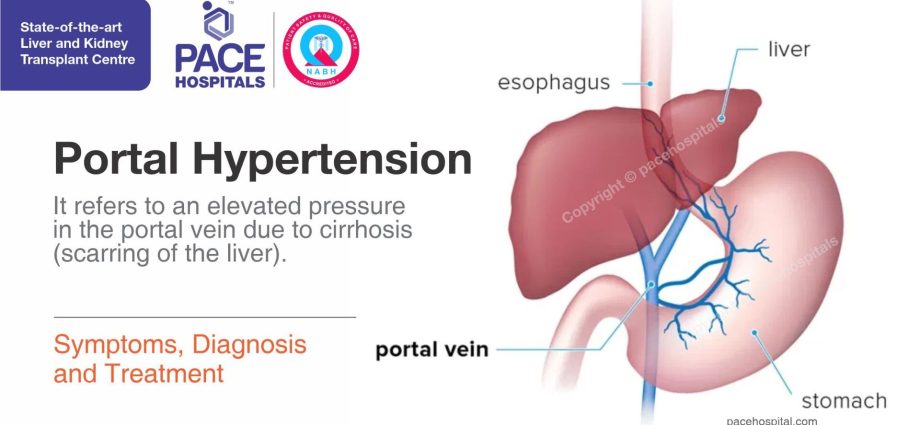Contents
What is portal hypertension
Portal hypertension is high blood pressure in the portal vein (it is also portal – hence the name of the pathology).
The portal vein is located in the abdominal cavity, receives blood from the digestive organs (large and small intestines, stomach, pancreas, spleen) and transfers it to the liver. The liver cleanses and filters waste from the blood. Then the blood enters the heart and goes into the general circulation.
In liver disease, active circulation within the liver can be blocked, which increases pressure in the portal vein. Ultimately, the blood is redirected around the liver, and new vessels form (often in the esophagus and stomach) that enlarge, twist, swell, and may burst. If this happens, the bleeding can be fatal.
Causes of portal hypertension in adults
There are 3 possible causes that can lead to portal hypertension.
Intrahepatic. These include cirrhosis and liver fibrosis (scarring of tissue). And the triggers of these diseases can be:
- alcohol;
- infectious hepatitis, including B and C;
- fatty liver disease;
- congenital disorders of copper metabolism (Wilson’s disease);
- hemochromatosis (an excess of iron in the body);
- cystic fibrosis (a genetic disease of the glands with the release of thick mucus);
- primary sclerosing cholangitis (sharp compaction of the bile ducts);
- atresia (complete absence) of the bile ducts, or poorly formed bile ducts;
- parasitic infections, such as schistosomiasis (found in the tropics).
Prehepatic. In this case, the vessels are blocked on the way to the liver. The reason may be:
- thrombosis of the portal vein, due to which the blood cannot circulate;
- congenital underdevelopment of the portal vein (it is almost completely closed).
Posthepatic. They occur due to impaired blood flow from the liver to the heart. They can be provoked by:
- thrombosis within the hepatic vein itself;
- thrombosis within a certain part of the inferior vena cava;
- restrictive pericarditis, in which the lining of the heart becomes rigid and prevents the heart from relaxing and expanding when blood returns to it.
Other causes of portal hypertension include tuberculosis, fungal infections, tumors, connective tissue disorders (eg, scleroderma), and complications from radiation therapy.
Signs of portal hypertension in adults
When blood cannot flow smoothly through the veins of the liver (from the portal vein to the sinusoids, from the hepatic to the vena cava), it tries to bypass the system by using other veins of the internal organs to return to the heart.
Manifestations of portal hypertension are formed as a result of complications due to a decrease in blood circulation through the liver, as well as an increase in pressure inside the veins in other organs through which blood is drained.
At first, there may be no symptoms. And they will appear only when a complication develops. These include:
- enlarged liver and spleen;
- varicose veins in the esophagus and stomach, which can cause abnormal bleeding, such as vomiting blood
- internal hemorrhoids;
- weight loss from malnutrition;
- accumulation of fluid in the abdomen (ascites);
- impaired renal function;
- low platelets in the blood;
- fluid in the lungs.
Treatment of portal hypertension in adults
The attending physician will ask the patient about the medical history, symptoms, risk factors, and family medical history. The doctor will conduct a physical examination. Unfortunately, healthcare professionals cannot measure high blood pressure in the portal vein with a cuff, as they do with normal high blood pressure.
Diagnostics
Several tests are used to make a diagnosis:
- blood test – low platelet count – the most common sign of portal hypertension;
- Ultrasound and CT – they will check for dilated veins around the liver and assess the risk of bleeding;
- endoscopic examination – it is used to detect dilated veins in the upper digestive tract.
Modern treatments
There are several treatment options for portal hypertension.
Medicines. With portal hypertension, the patient may be prescribed beta-blockers – they improve the functioning of the heart and blood vessels, reduce the risk of bleeding from swollen veins.
Operations. In severe cases, bypass surgery, which is the placement of stents in the portal vein, may be required to improve blood flow. Bypass surgery can be done with or without surgery. Surgical shunting can cause more complications than the non-surgical method.
Liver transplant. It is done for liver failure.
Prevention of portal hypertension in adults at home
Some liver diseases caused by congenital disorders of copper and iron metabolism cannot be prevented. The same can be said about congenital problems of anatomy.
In cases where the disease is provoked by drugs, alcohol or other stimulants, prevention is possible and it is simple:
- you need to take any medication strictly as prescribed by the doctor, and in case of side effects, inform the doctor about it so that he can adjust the therapy;
- give up alcohol or reduce its use to a minimum, do not use drugs – they often cause hepatitis B and C, which leads to cirrhosis of the liver and portal hypertension.
Popular questions and answers
Answered questions about portal hypertension Natalia Zavarzina, a gastroenterologist, hepatologist, and dietitian at the clinic.
An ambulance should be called immediately in case of bloody vomiting, a sharp drop in blood pressure.










